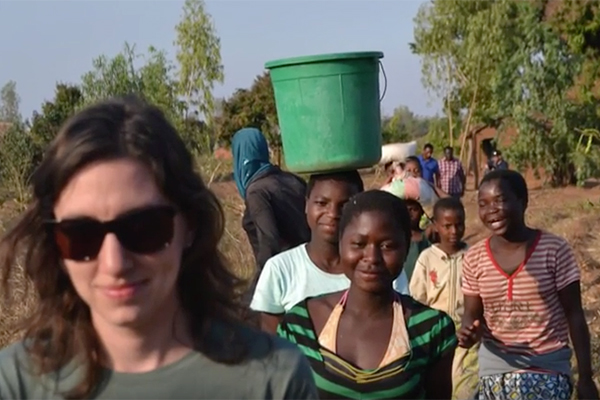Engineers Without Borders to implement water systems in Malawi, Philippines
Classroom skills became the foundation of real-life solutions for 10 members of the University of Delaware’s Engineers Without Borders (EWB-UD) chapter this August, as they ventured into the field to explore plans for implementing potable water systems in Malawi and the Philippines.
New Beginnings in Ubujan
Led by Kim Bothi, UD Institute for Global Studies associate director for science and engineering, Kim Bothi, a team of four EWB-UD students – including Sarah Hartman, Achyuth Madabhushi, Natalie Muneses and Ben Smith – and Maryland-based professional engineer and UD alumnus Jimit Modi traveled to the Philippines with the goal of establishing a formal relationship with the small community of Ubujan, located on the island of Bohol.
During the initial assessment trip, students made connections and conducted interviews with local residents, including the Barangay and Water councils, appointed specifically by the community to support a future water project.
Members of the team also met with representatives from the Philippines Department of Health and Provincial Planning and Development Office to assess existing information on water conditions before collecting their own data. “Overall, we found that water sources were contaminated with E. coli and contained high levels of unsafe products,” said Muneses, a sophomore biomedical engineering major.
According to Bothi, EWB-UD co-adviser, “The students demonstrated their ability to take challenges in stride and quickly adapt to evolving conditions.”
These are the skills, she said, that salvaged data collection after minor equipment difficulties.
For Muneses, whose family grew up in this small town, the project carried a particularly personal weight. “I have heard endless stories about my father’s and grandparents’ childhoods,” she said, “but experiencing it first-hand was indescribable. I came to understand how helping a community is more than just a project… The team as a whole was introduced to a new culture that we grew to love.”
The students, who immersed themselves completely in the experience, are now working remotely with the local water council to collect seasonal measurements. “This is a true community partnership,” noted Bothi.
EWB-UD will complete a second assessment trip next year to collect the remaining information needed before implementing a solution in the village.
EWB-UD in Malawi
More than 6,000 miles to the east, the Malawi team conducted its second assessment trip in the village of Mphero. With a population of nearly 600 and no functioning clean water source of their own, villagers rely on other communities or their one local, but contaminated, source.
In Mphero, students Kyle Lusignea, Meredith Simon-Pearson, Dakota Rollings and Arvind Annamalai, along with faculty mentor Gretchen Bauer, professor of political science and international relations, and professional engineer Walt Walker of Philadelphia, collected the final data needed to create a potable water solution for the village.
The group will rely on ethnographic data gathered from residents along with detailed site maps, topographical surveys and soil resistivity information to determine the best solution for Mphero’s needs.
Members also continued to strengthen their relationship with in-country partners, Villages in Partnership (VIP) and the Blantyre Synod Health and Development Commission(BSHDC), each of which work to promote development in Malawi by pairing organizations like EWB-UD with local communities.
According to Simon-Pearson, collaboration with these organizations is an essential factor in ensuring the success of the project. BSHDC “was incredibly helpful in giving us valuable feedback prior to going into households and conducting surveys for vital information,” she said.
In preparation for the first stages of implementation in 2016, the team met with local companies that have the necessary technical and regional knowledge to assist in its execution.
“We worked with experts from a local university, with officials from the Ministry of Water, and with business professionals such as well drillers and tank suppliers,” said Lusignea, a senior honors chemical engineering major and president of EWB-UD.
In the months ahead, the chapter will determine whether to install a rainwater catchment system, borehole well, shallow well, or some combination of these structures to provide Mphero with the clean and accessible water sources it needs.
After completing this first pilot project, EWB-UD hopes to execute similar projects in four surrounding villages.
Regardless of their location, each EWB-UD student has the unique opportunity to apply skills and logic learned at the University to create impact on a global scale.
For Muneses, this became evident during her first moments in the Philippines. “When we first arrived, a little girl came up to the well to collect water. She had two five gallon containers,” she said, adding that the containers had no lids and had been repurposed from bleach bottles. “We asked her how far of a walk her house was and she said 100 meters. At this moment I realized the reason we were there.”
This experience and understanding will place EWB-UD members among the ranks of emerging leaders in the engineering field.
“Students who work on global projects gain practical multidisciplinary experience that can’t be replicated in the classroom,” said Bothi. “They gain a sense of what it is like to work across cultures, with language barriers, and often under harsh conditions and unpredictable circumstances.”
EWB-UD actively seeks students from all academic backgrounds for its projects. Students from any academic discipline who are interested in becoming a part of the chapter are encouraged to attend a weekly meeting, held Tuesdays at 7 p.m. in 304 Gore Hall.
For more information on EWB-UD, visit the chapter’s Student Central site or contact co-advisers Kim Bothi or Abbie Clarke-Sather.
UDaily article by Nikki Laws | Videos by Ashley Barnas, Nikki Laws, Kyle Lusignea, Natalie Muneses, Joel Muneses, and Kim Bothi

